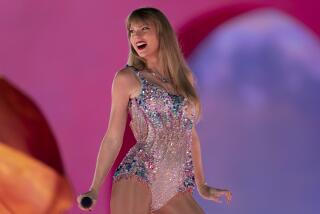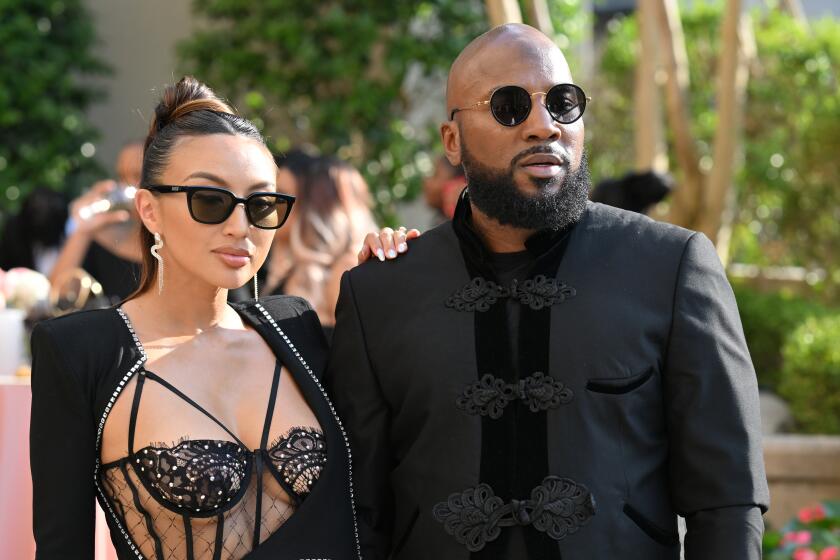Pop in ‘Idol’ hands
AMERICA, order has been restored. A white man with the canonical tastes of the classic-rock generation has won “American Idol.”
Never mind that he was born in 1976, more than a decade after the British Invasion bands took Elvis’ cue and made amped-up rhythm and blues rock’s musical template. Taylor Hicks is, in his heart and well-patrolled soul, a baby boomer -- a believer in old-fashioned artistic authenticity, who spent years playing oldies at frat parties before charming America with a style untouched by his own generation’s hip-hop and alternative rock. For all the judges’ yammering about Hicks’ originality, he’s a throwback, the most traditionalist winner in the contest’s history.
Yet in the “Idol” world, Hicks does break the mold. That’s because the show is virtually the only mainstream public space where women and people of color set the norm. (One major parallel is “Idol’s” daytime mirror, “Oprah.”) It took five seasons for a white guy to win; compare this to media moments like Halle Berry’s tearful 2002 best actress Oscar speech, or young Michelle Wie’s current encroachment on the paternalistic world of professional golf.
In pop, rap mingles with country and teen tunes on the charts, but white-dominated classic rock sets the standards. Baby-boomer artists and their inheritors still gain critical kudos and dominate history books; pop novelties and show people sell sans respect. A new generation, raised on hip-hop and the rising tide of social diversity, is questioning these “rockist” standards. But a look at last year’s Grammy winners -- Green Day and U2 over Gwen Stefani and Kanye West -- shows that they’re still pretty much in place.
On “Idol,” though, rock has never won. Stuffy Simon Cowell may be the show’s strongest critical voice, but his European musical sweet tooth leads him to favor pop tarts over guitar gods and crusty prophets. The “rockers” who do succeed aren’t innovators or even very distinctive; just like expert song interpreter and finalist Katharine McPhee, they’re better at adapting to styles and trends than defining them.
Chris Daughtry, this year’s appealing but over-hyped rock savior, so smoothly fits into the modern-rock herd that he’s already been asked to join the fairly faceless band Fuel. Daughtry even borrowed his most ostensibly original move, a steaming version of Johnny Cash’s “I Walk the Line,” from his heroes, Pennsylvania rockers Live. Joining Live onstage during the “Idol” finale, Daughtry resembled a slightly tarnished clone of singer Ed Kowalczyk, who appeared happier than he’s been since Live’s last chart success in the 1990s.
The marginalization of rock on “Idol” accurately reflects its eclipse in the mainstream, no matter who keeps getting inducted to the Rock and Roll Hall of Fame. And in its cheesy way, “Idol” is helping to institutionalize a new vision of pop history. Guest judges like Barry Manilow wouldn’t make most critics’ short list of legends, but on “Idol” they’re royalty.
The season finale followed suit. The star-studded evening featured, among others, hip-hop diva Mary J. Blige, jazz singer Al Jarreau and the original anti-rocker, composer Burt Bacharach, with his muse, smooth Dionne Warwick. The only hard rock artist besides Live was Meat Loaf, whose very theatrical, off-key duet with McPhee highlighted her potential as the next Sarah Brightman rather than giving her any kind of edge. The night’s surprise capper, a performance by Prince, also felt like a triumphant slap in the old guard’s face. Here was tomorrow’s rock god: an undisputed genius who deliberately defies categories -- racial, musical and even erotic.
Call it a new paradigm or a mishmash, but “Idol” is telling us something about pop’s future beyond classic rock. Its structure is designed to help people learn how to assess music within that future’s rules. The program’s greatest pleasure comes in putting oneself in the judge’s chair and trying to figure out what makes a pop performance great. Old standards -- the ones that made icons of the Beatles, Dylan, even Pearl Jam -- don’t apply. Simon, Paula and even old-fashioned, instrument-playing rock-soul dude Randy teach us to appreciate polish, charm and, yes, corniness, as much as originality and emotional honesty.
These new pop values are also old values, recalling the pre-rock world of Tin Pan Alley and the Brill Building. That’s why “Idol” has a strange out-of-time feeling, and why, though their albums sell in the millions, the winners never seem exactly like stars. It’s hard to give up classic rock’s romance with the beautiful freak; we want our artists to stand out, to be as daring as their music can make us feel. The Idols are more like America’s Pop Models; just as Tyra Banks tells her future cover girls to restrain their quirks and serve the fashion paradigm, so Cowell does with his pliant ingenues.
Taylor Hicks stood out because he found a way to play Simon’s game without sacrificing himself. Not a great performer beyond his beloved blues and soul oldies, Hicks stayed within that realm through gesture and inflection even when singing contemporary songs. And because his references were so different -- so unusually classic -- he came off as unique.
Runner-up Elliott Yamin displays a much better knack for contemporary soulfulness; his light tone and agile phrasing suggest that he’s actually listened to today’s urban playlists. Hicks, on the other hand, has a rocker’s definition of soul; it stops at the moment the first DJ spun a turntable, or even when George Clinton and Sly Stone transformed funk. This stood out on “Idol,” and it should serve him well within the music industry establishment. But it doesn’t make him the face of the future, just a smiling visitor from the past.
Times pop music critic Ann Powers can be e-mailed at ann.powers@latimes.com.
More to Read
The biggest entertainment stories
Get our big stories about Hollywood, film, television, music, arts, culture and more right in your inbox as soon as they publish.
You may occasionally receive promotional content from the Los Angeles Times.






